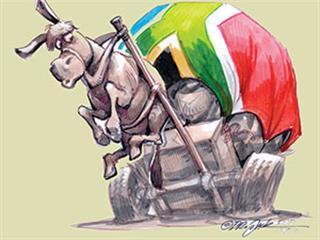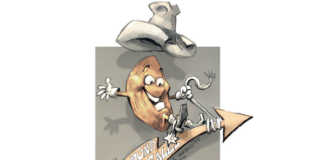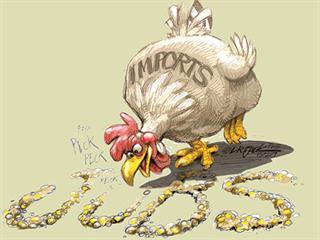
Any farmer will tell you that growth is ultimately dependent on carrying capacity. In agriculture, this is influenced by soil fertility, grass species, climate and the availability of water. Exceeding the carrying capacity results in negative consequences, such as veld damage, soil destruction, erosion, poorer crop/stock return and, ultimately, reduced profits leading to bankruptcy. And it’s exactly the same for a country!
The misunderstood and misused term ‘sustainability’ is far too vague to deal with the complexities of a country’s ability to support itself. Without examining a country’s carrying capacity, it is impossible to determine if a ‘sustainable future’ is achievable. The first priority, then, is to unpack our carrying capacity and avoid unachievable promises of growth. Factors already impacting negatively on the ability of a country to support itself must be corrected before any vision of growth can be realised.
Farmers know that planning for carrying capacity needs to occur at various levels, ultimately adding up to the farm’s overall carrying capacity. As far as the country is concerned, the following types of carrying capacity must be taken into account:
- Ecological – The ability of the environment to support a certain number of people, leaving enough resources for the environment’s own needs.
- Physical – The space available and the level of infrastructure in place.
- Economic – Knowing the make-up and sophistication of the business sector and whether it is capable of employing a certain number of people at an income level that will provide them with a satisfactory living standard.
- Social – Population number, age mix, level of education and skills, growth projection and distribution.
In addition, there are many factors that are more or less outside human control, such as the effects that global warming will have on our water resources, food production and overall survival. Unless the various facets of carrying capacity are in balance, sustainable growth will be hindered. For example, South Africa’s ‘economic carrying capacity’ is directly linked to the ‘social carrying capacity’ – population numbers, level of education and the ability of the business sector to employ job seekers.
The situation is made more complex by labour unions demanding wages that are higher than business can afford. Given the number of unemployed, it’s obvious that South Africa’s economic and social carrying capacities have already been exceeded. Thus, we see conflict between an over-supplied labour force and too few job opportunities. Another problem is that South Africa is a water-scarce country and our resources are already under pressure.
This will negatively affect the ecological carrying capacity of the country unless we can institute successful water-demand management, recycling and pollution control. Some positive achievements have occurred here during the past few years, but the foot must not be taken off the pedal.
In 2012, Statistics SA’s figures showed an increase of seven million people during the past 10 years, bringing us to a total population of 51,8 million. If one adds the several million foreign nationals also seeking their fortune in South Africa, it’s obvious that this rate of population growth will soon exceed our economic, social, physical and ecological carrying capacities. As each is interdependent, a compounded negative knock-on effect will occur.
Put bluntly, there are simply too many people for the country’s overall carrying capacity as it currently exists. This is true not only for South Africa. The reason so many foreign nationals seek refuge and employment elsewhere is because the carrying capacities of their own countries have been exceeded. This helps to explain China’s ventures into Africa – it’s not just about business, it’s also about securing land for food production and mineral resources to feed the masses back home.
Drastic action
What needs to be done? Planners, as well as social and environmental scientists, need to describe in harsh terms the situation as it really is. Society has become too apologetic and ‘politically correct’. Here are five actions that must be instituted:
- Planners must consider the number of people the country can support at present. In other words, they must determine our carrying capacities against the status quo and calculate the deficits.
- Until we know the deficits, we must reduce the influx of low-skilled people into the country – they are increasing competition for jobs at the lower end of the market and limiting the potential for skills development of our own people. We need to only allow those into the country who have skills that will benefit South Africa. There should also be a proviso that immigrants create a business and employ local residents within two years, or else leave. This is an accepted criterion in other countries. Unbridled influx from the north is only making the situation worse by allowing more and more people to crowd into cities already over-populated above what the urban carrying capacity can support. This compounds social decay and leads to environmental damage.
- Incentivise a lower population growth. Teenage pregnancies, especially within the poorer sectors of society, are a problem. A government child support grant for the first-born is acceptable. But for the second child it should be less, and for any subsequent children, no child support should be provided.
- Incentivise private support and increase government support of the small business sector and get rid of the bureaucratic red tape hampering business.
- Promote urban agriculture through mixed land-use planning for new community developments. About 30% of South Africa’s population is younger than 15. This group does not want to live in far-off rural areas.
Urban growth will continue and it’s here that the masses of unemployed will need to be fed. City planners must set aside land suitable for ‘urban farming’. This is the only way to feed the hungry and for a small-scale business and support service sector to grow.
Sensible and sensitive consumption
Society needs to wake up to the fact that the earth’s resources are finite. There needs to be a fundamental and massive shift in the way we distribute and use these resources. Grow-and-buy-local must be promoted. Wealthy consumers should downscale their use of resources to enable an equitable distribution to the poorer end of society. Unless this happens, more social conflict and strife will occur, to the detriment of all.
Sound political leadership will be needed to create an environment that allows goodwill to trounce the current misuse of taxpayers’ money, greedy business and privileged politicians. Growth isn’t just about ever-increasing turnover and profits; it’s also about levelling the playing field.
Ritchie Morris (Pr Sci Nat) is an independent environmental hydrogeologist and runs his own consultancy. Contact him at [email protected]. The views expressed in our weekly opinion piece do not necessarily reflect those of Farmer’s Weekly.













